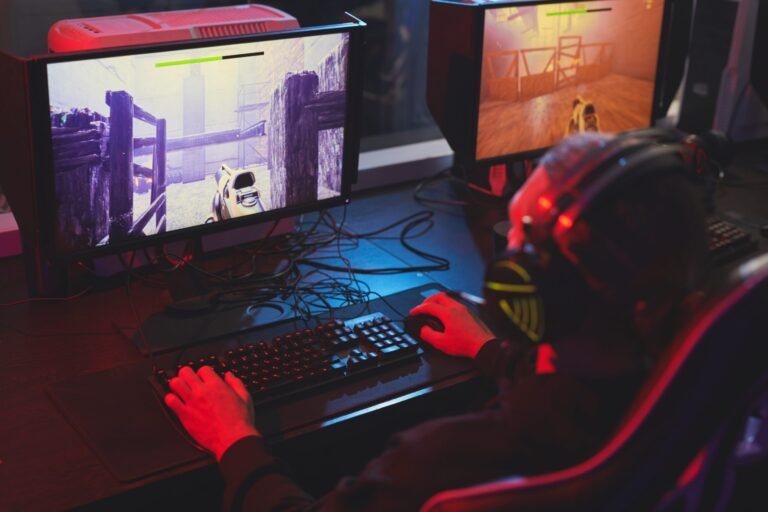Introduction
As online gaming continues to rise in popularity, concerns about gaming addiction have emerged. While online gaming can provide entertainment, social connection, and personal growth, it is essential to recognize the potential risks and challenges associated with excessive gaming. Online gaming on voj8 bet allows players to test their skills against others. In this article, we will explore the topic of online gaming addiction, break the stigma surrounding it, and discuss strategies for finding a healthy balance in gaming habits.
Understanding Online Gaming Addiction
Online gaming addiction, also known as gaming disorder, is a behavioral addiction characterized by excessive and compulsive gaming that impairs daily functioning and overall well-being. Like other addictions, it can have detrimental effects on various aspects of a person’s life, including physical health, mental well-being, relationships, and academic or professional performance. It is important to understand that gaming addiction is a complex issue influenced by various factors, such as individual susceptibility, game design, social dynamics, and underlying psychological or emotional challenges.

Breaking the Stigma
To address online gaming addiction effectively, it is crucial to break the stigma surrounding it. Addiction is a complex health issue that requires understanding, empathy, and support. Instead of stigmatizing individuals struggling with gaming addiction, we should promote open discussions, education, and resources to help those affected. Recognizing gaming addiction as a legitimate concern allows for early intervention, access to treatment, and the development of healthier gaming habits.
Signs and Symptoms
Identifying the signs and symptoms of online gaming addiction is essential for early intervention. Some common signs may include:
- Preoccupation with gaming: Constant thoughts about gaming, feeling restless or irritable when not playing.
- Loss of control: Inability to limit gaming time, unsuccessful attempts to cut back or stop gaming.
- Neglecting responsibilities: Neglecting personal, academic, or professional responsibilities due to excessive gaming.
- Withdrawal symptoms: Irritability, restlessness, or depression when not playing games.
- Escaping reality: Using gaming as a means to escape from stress, anxiety, or other emotional challenges.
- Interference with relationships: Neglecting social interactions, spending less time with family or friends due to gaming.
- Physical symptoms: Sleep disturbances, headaches, eyestrain, or other physical issues related to excessive gaming.
It is important to note that experiencing some of these symptoms does not necessarily mean someone has a gaming addiction. However, if these symptoms persist and significantly impact daily life, it may be indicative of a more serious issue.
Finding Balance and Healthy Gaming Habits
For individuals who enjoy online gaming but want to maintain a healthy balance, it is essential to establish and practice healthy gaming habits. Here are some strategies to consider:
- Set limits: Establish specific time limits for gaming and stick to them. Use timers or alarms to remind yourself when to take breaks.
- Prioritize responsibilities: Ensure that personal, academic, and professional responsibilities are fulfilled before indulging in gaming.
- Diversify activities: Engage in a variety of activities beyond gaming, such as physical exercise, hobbies, socializing, or pursuing personal interests.
- Create a schedule: Plan a well-balanced schedule that includes time for gaming as well as other important activities. This helps maintain structure and prevents excessive gaming.
- Practice self-care: Prioritize self-care activities, such as adequate sleep, healthy eating, and managing stress. Taking care of your overall well-being can help prevent excessive gaming as a coping mechanism.
- Set boundaries: Communicate your gaming limits with friends and family, and ask for their support in keeping you accountable.
- Seek support: If you find it challenging to manage your gaming habits on your own, consider reaching out to supportive friends, family members, or seeking professional help from a counselor or therapist.
Promoting Healthy Gaming Communities
Game developers and online gaming platforms also play a crucial role in promoting healthy gaming habits. By implementing responsible gaming features, such as activity trackers, reminders, and parental controls, they can empower players to monitor and regulate their gaming time effectively. Additionally, fostering positive and inclusive gaming communities that promote fair play, sportsmanship, and respect can contribute to a healthier gaming environment for everyone.
Conclusion
Online gaming addiction is a real concern that affects individuals worldwide. By breaking the stigma surrounding gaming addiction, recognizing the signs and symptoms, and promoting healthy gaming habits, we can help individuals find a balance between their gaming enjoyment and other aspects of life. Remember, gaming should be a source of entertainment and personal growth, not a detriment to well-being. By fostering understanding, providing support, and practicing responsible gaming, we can create a positive gaming culture that benefits players and the community as a whole.

